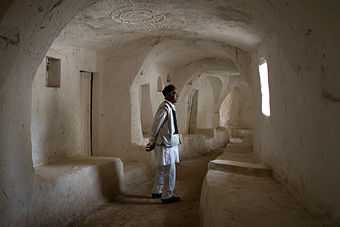Environmental psychology

"We shape our buildings and our buildings shape us." - Churchill
Environmental psychology = the effects of our enviroment on our psychology and the effects it has on our outcomes in life.
"Traditionally, the field of environmental psychology has emphasized how the physical environment affects human thoughts, feelings, and behaviors. However, much recent environmental research has stressed the other side of the coin - how human actions affect the environment." (Oskamp & Schultz, 1998, p. 206)
Scope
Although "environmental psychology" is arguably the best-known and more comprehensive description of the field, it is also known as environmental social sciences, architectural psychology, socio-architecture, ecological psychology, ecopsychology, behavioral geography, environment-behavior studies, person-environment studies, environmental sociology, social ecology, and environmental design research.
Topics
.jpeg)
Defensible spaces are created in exam settings.
.jpg)
"Some religious philosophers (e.g., Ophuls, 1977; White, 1967) have argued that the materialism of Western societies is largely the result of Christian beliefs...A related problem stems from the fact that many passages from the Bible indicate that humans were created to rule over nature." (Oskamp & Schultz, 1998, p. 210)
Possible topics within environmental psychology include:
- Coping with disasters
- Density and crowding
- Environmental attitudes
- Environmental behaviours
- Environmental education
- Human spatial behaviour
- Natural environment
- Psychobiological effects of nature
- Workplace environments
- Category:Environmental psychology (Wikipedia)
See also
- Environmental psychology (Lecture notes)
| | Search for Environmental psychology on Wikipedia. |
References
- Oskamp, S., & Schultz, P. W. (1998). Environmental issues: Energy and resource conservation. In S. Oskamp & P. W. Schultz (1998). Applied social psychology (2nd ed.) (Ch11, pp. 205 - 228). Prentice Hall: Upper Saddle River, NJ.
External links
Online resources
- Psicología Ambiental: elementos básicos (A comprehensive introduction to environmental psychology, in Spanish)
Associations
- Environmental psychology (34th division of the American Psychological Association)
- Psychology and the Environment (Special Interest Group, Australian Psychological Society)
Journals
Articles
- Ecotherapy - the green agenda for mental health (UK Mind Week Report 2007)
- Environmental psychology: An endangered species? (Reser, InPsych, August, 2008)
- Current trends in environmental psychology (1996)
- Scenes of nature trump technology in reducing low-level stress (June, 2008)
- Green is good for you (2001)
- Threats to the environment (poll, 2002)
Models
Videos
This article is issued from Wikiversity - version of the Friday, August 22, 2014. The text is available under the Creative Commons Attribution/Share Alike but additional terms may apply for the media files.